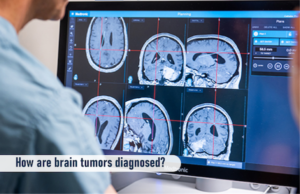How are Brain Tumors Diagnosed?

Brain tumors are complex and require accurate diagnosis to determine the appropriate treatment plan. Detecting brain tumors early and accurately is crucial for improving patient outcomes. In this article, we will explore the diagnostic methods used to identify brain tumors and the importance of a multidisciplinary approach.
When facing the possibility of a brain tumor, understanding the diagnostic process is essential for patients and their loved ones. The diagnosis of a brain tumor involves a combination of medical history evaluation, physical examination, and various imaging and laboratory tests. Let's delve into the details of how brain tumors are diagnosed and the importance of this crucial step.
Understanding Brain Tumors
What is a Brain Tumor?
A brain tumor is an abnormal growth of cells in the brain. These tumors can be either benign (non-cancerous) or malignant (cancerous). They can originate from brain tissue itself or spread to the brain from other parts of the body. Brain tumors can cause a wide range of symptoms and require timely diagnosis for appropriate management.
Importance of Diagnosis
Accurate diagnosis is the foundation of effective treatment for brain tumors. It helps determine the tumor type, location, size, and grade, providing crucial information for developing a personalized treatment plan. Additionally, an early and accurate diagnosis allows healthcare professionals to promptly initiate interventions, potentially improving patient outcomes.
Symptoms and Red Flags
Brain tumors can manifest in various ways, and their symptoms may vary depending on the tumor's location, size, and growth rate. Some common symptoms include persistent headaches, seizures, changes in vision or hearing, cognitive difficulties, and motor coordination problems. These symptoms, often referred to as "red flags," should prompt further investigation and diagnostic testing.
Brain Tumor Diagnostic Procedures
To diagnose a brain tumor, healthcare professionals employ a combination of procedures to gather as much information as possible about the tumor. The diagnostic process usually involves the following steps:
Medical History and Physical Examination
A comprehensive medical history assessment helps healthcare professionals understand the patient's symptoms, risk factors, and overall health. During the physical examination, the doctor may look for specific neurological signs and assess cognitive function, coordination, and reflexes.
Imaging Tests
Imaging tests play a crucial role in diagnosing brain tumors. Magnetic Resonance Imaging (MRI) and Computed Tomography (CT) scans provide detailed images of the brain, allowing healthcare professionals to identify the presence, location, and characteristics of the tumor. These tests may require the use of contrast agents to enhance visualization.
Biopsy
A brain tumor biopsy involves the removal of a small sample of tissue for laboratory analysis. This procedure helps determine the tumor's exact type, grade, and genetic characteristics, which are essential for guiding treatment decisions. Biopsies can be performed through open surgery, stereotactic biopsy, or during surgery for tumor removal.
Molecular Testing
Molecular testing, also known as genetic testing, examines the genetic and molecular characteristics of the tumor cells. It provides valuable information about the tumor's specific genetic alterations, allowing for targeted therapies and personalized treatment approaches.
Other Diagnostic Tools
In addition to the above procedures, healthcare professionals may utilize other diagnostic tools such as Positron Emission Tomography (PET) scans, functional MRI (fMRI), and electroencephalography (EEG) to gather further information about the tumor's characteristics and its impact on brain function.
Multidisciplinary Approach
Diagnosing brain tumors often involves a multidisciplinary team of healthcare professionals, including neurologists, neurosurgeons, radiologists, pathologists, and oncologists. This collaborative approach ensures that all aspects of the diagnosis, including accurate interpretation of imaging and laboratory results, are thoroughly evaluated. The combined expertise of the team enables a comprehensive evaluation of the tumor and helps determine the most appropriate treatment strategy.
Conclusion
Accurate and timely diagnosis is paramount in the management of brain tumors. The diagnostic process involves a careful evaluation of medical history, physical examination, and a range of imaging and laboratory tests. Collaboration among healthcare professionals from different specialties ensures a comprehensive assessment and personalized treatment plan. By understanding the diagnostic methods for brain tumors, patients and their families can actively participate in the decision-making process and receive the best possible care.
FAQs (Frequently Asked Questions)
How are brain tumors diagnosed?
The diagnosis of brain tumors involves a combination of medical history evaluation, physical examination, imaging tests (such as MRI or CT scans), and sometimes a biopsy to analyze the tumor's characteristics.
What are the common imaging tests used for diagnosis?
Common imaging tests for diagnosing brain tumors include Magnetic Resonance Imaging (MRI) and Computed Tomography (CT) scans, which provide detailed images of the brain to identify the presence and characteristics of the tumor.
Is a biopsy always necessary for diagnosis?
While imaging tests can provide valuable information, a biopsy is often necessary to determine the exact type, grade, and genetic characteristics of the brain tumor, guiding treatment decisions.
How long does it take to get a diagnosis for a brain tumor?
The time required for a brain tumor diagnosis can vary depending on several factors, such as the availability of imaging facilities, the need for additional tests, and the complexity of the case. In some cases, it may take several days to weeks to establish a definitive diagnosis.
Can brain tumor symptoms mimic other conditions?
Yes, the symptoms of brain tumors can overlap with those of other neurological conditions. That's why a comprehensive evaluation, including imaging tests and sometimes a biopsy, is necessary to differentiate brain tumors from other conditions.